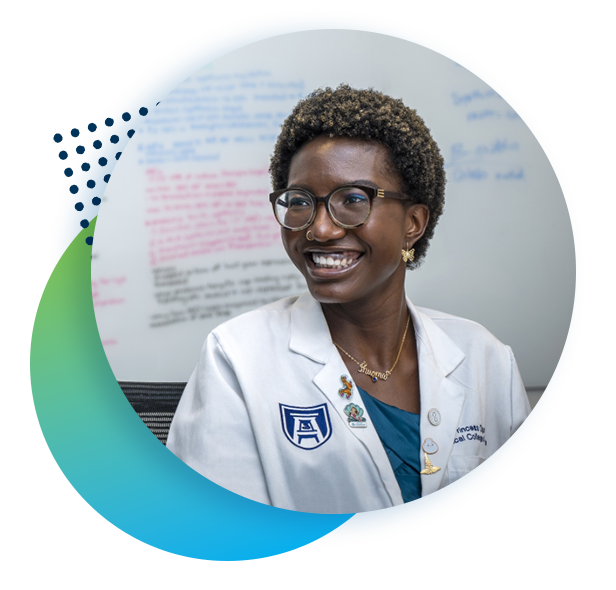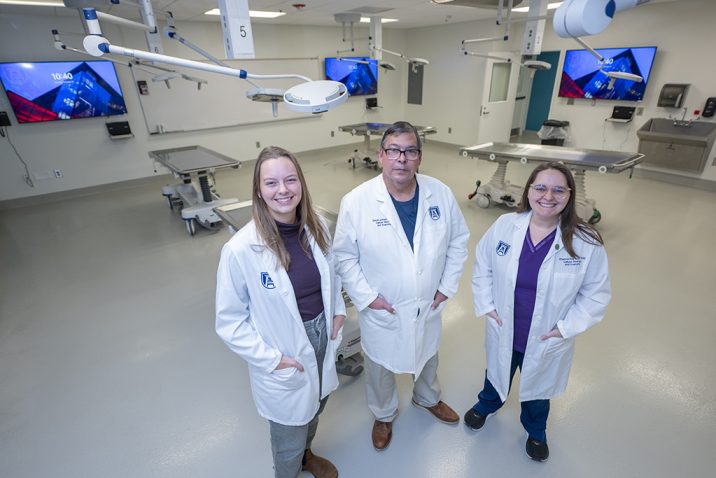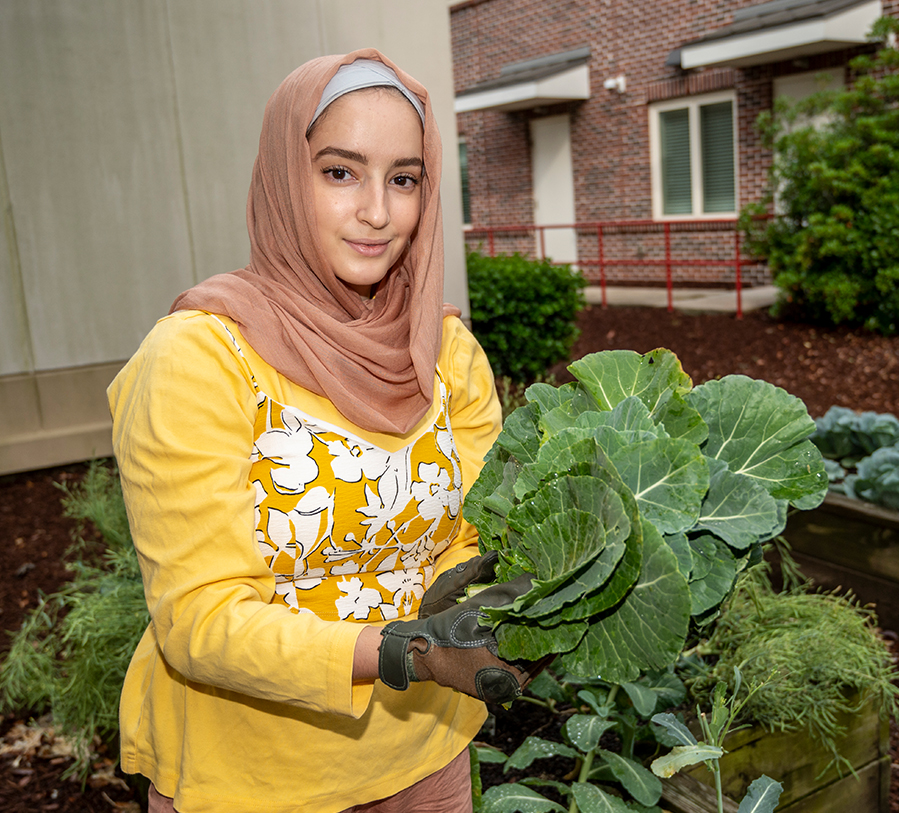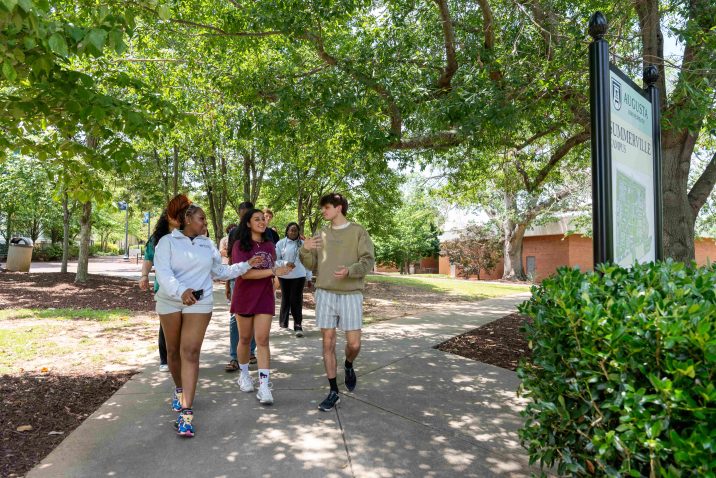Allied Health
Known as the MS-Dietetic Internship Program, the Master of Science in Allied Health with a concentration in Nutrition and Dietetic Internship trains students to be dietitians and nutrition practitioners, preparing them for careers including registered dietitian nutritionists, public health nutritionists, or nutrition researchers.
By choosing to earn your degree from Augusta University’s College of Allied Health Sciences, you’ll be part of a program with a long history of producing high-performing graduates.
Allied Health is for you if you consider yourself
Life-Changing
Life-Saving
Education
Want to learn more about the Allied Health program at Augusta University?
Request InfoWhat You'll Study
Coursework
Students in the Master of Science in Allied Health with a concentration in Nutrition and Dietetic Internship program will complete a total of 45 credit hours, including a total of nine credit hours of dietetic internship.
The program is designed to take 21 months to complete.
After successfully completing the program, graduates are eligible to sit for the registration exam to be credentialed as a Registered Dietitian Nutritionist (RDN).
Curriculum | Admissions Criteria | Tuition and Fees | Application Deadlines



EXPLORE. EXCEL. EXPAND.
Graduate School Advantage
Augusta University's graduate programs are among the best in the nation – and the world – and our graduate students are our most valuable assets. To ensure that our students earn more than a degree, the Graduate School offers a range of opportunities so they can develop the leadership, communication and personal skills needed for a rewarding life and academic, research or professional career.
See what the Graduate School has to offer »
About the Graduate SchoolExperience-based Education
Outside the Classroom
Students in the MS-Dietetic Internship Program learn not only in the classroom, but through supervised practice. The internship aspect of the program capitalizes on the wide variety of medical and healthcare facilities located in the Augusta area.
Being located on the campus of an academic health center, students in the program enjoy full access to state-of-the-art research, student learning resources and the visiting clinicians and scholars who visit as part of the university’s robust lecture series.
The research-directed capstone allows students to take advantage of the university’s interdisciplinary research opportunities.
Small Classes
Since the program accepts only 16 graduate student interns each year; you’ll never be lost in the crowd.
Student Success
One hundred percent of graduates were employed in the field of nutrition and dietetics within one year of completing the program and 97% passed the RDN exam within one year of their first attempt.
State-of-the-Art Facilities
Along with rotations at Wellstar MCG Health and the Children’s Hospital of Georgia, students utilize the university’s high-fidelity simulation center.
Student Organizations
Student organizations like the Students of Nutrition in Allied Health Club (SNAHC) provide community service opportunities that positively impact the both participants and recipients.
Your Future
Career Options
According to the U.S. Bureau of Labor Statistics, the median pay for dietitians and nutritionists is $61,650 per year. About 30 percent of dietitians and nutritionists report working in some form of hospital.
Admissions Criteria at a Glance
GPA: Minimum overall GPA of 3.0 on a 4.0 at the Baccalaureate level calculated on all undergraduate work attempted.
Degree Requirement: Minimum of a Bachelor’s degree or equivalent from an accredited college or university. To satisfy degree requirements, the evaluation of foreign education transcripts must demonstrate that the degrees earned are equivalent to those awarded in the United States.
Transcripts: Official transcripts are required from all universities and colleges ever attended. Transcriptions should be submitted when applications are submitted using DICAS.
Standardized Test Requirements: None are required for this program.
Letters of Recommendation: Recommendations (which include a reference form and letter of recommendation) from three individuals are required.
All applications, transcripts, and letters of recommendation must be submitted at https://dicas.liaisoncas.com. DICAS sends all information directly to Augusta University.
Undergraduate Coursework: Applicants must meet the requirements to receive a verification statement from an Accreditation Council for Education in Nutrition and Dietetics (ACEND) accredited Didactic Program in Dietetics (DPD) before enrollment.
International Students: Please review the verification process for international transcripts and the English proficiency requirement.
Tuition & Fees Estimate
$4,801*
Estimated total
Full-time / In-State / Per Semester
$401
Tuition Per Hour
$675
Mandatory Fees
View Detailed Program Tuition
*Tuition & Fees listed here are for in-state students enrolling in the university for Fall 2024 semester.
Detailed Program Tuition InformationApplication Deadlines
Fall '26 Application Deadline
- February 1, 2026
Early submission of all application materials is strongly advised.
All required application materials and documents must be received in order for an application to be considered complete and before an admission decision can be made. Applications and supporting materials received after the program deadline will only be considered on a space-available basis.

Why Augusta?
The hands-on element of the program means you’re going to graduate with practical field experience and a network of colleagues and practitioners.
The program’s high job placement rate ensures that employers are impressed by the quality of your education and training.
Located on the Health Sciences Campus, the MS-Dietetic Internship Program puts students at the heart of Augusta University’s diverse research enterprise as well as its hospitals and clinics.

Families leave lasting contribution to medical science with body donations
Families leave lasting contribution to medical science with body donations


